Algorithms in Social Media Addiction Lawsuits
- Last Updated: June 12th, 2025

Attorney Jessie Paluch, founder of TruLaw, has over 25 years of experience as a personal injury and mass tort attorney, and previously worked as an international tax attorney at Deloitte. Jessie collaborates with attorneys nationwide — enabling her to share reliable, up-to-date legal information with our readers.
Legally Reviewed
This article has been written and reviewed for legal accuracy and clarity by the team of writers and legal experts at TruLawsuit Info and is as accurate as possible. This content should not be taken as legal advice from an attorney. If you would like to learn more about our owner and experienced injury lawyer, Jessie Paluch, you can do so here.
Fact-Checked
TruLawsuit Info does everything possible to make sure the information in this article is up to date and accurate. If you need specific legal advice about your case, contact our team by using the chat on the bottom of this page. This article should not be taken as advice from an attorney.
Key Takeaways:
- Social media addiction lawsuits target the intentional design choices and algorithms that may foster addiction.
- There is a growing legal scrutiny of the ethical responsibilities and practices of social media companies.
- The outcome of these lawsuits could significantly impact the future landscape of social media platforms and their design.
Overview of Algorithms in Social Media Addiction Lawsuits
On this page, we’ll discuss the role of algorithms in social media mental health lawsuits, how they contribute to social media addiction, their impact on ongoing social media lawsuits, and much more.
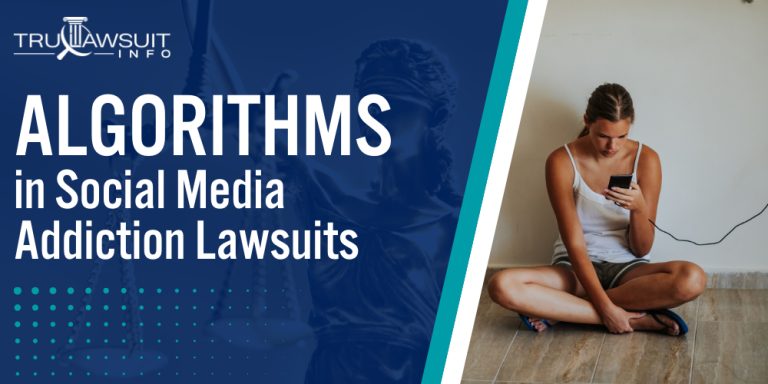
Intro to Algorithms in Social Media Lawsuits
Here are some key points about algorithms in social media lawsuits:
- Algorithms personalize content feeds based on user behavior, potentially exposing them to harmful content
- They prioritize engagement over user well-being, leading to addiction and mental health issues
- Plaintiffs argue that algorithms are designed to exploit psychological vulnerabilities, especially in young users
If you or a loved one has suffered from mental health issues due to social media use, you may qualify to participate in the Social Media Mental Health Lawsuit.
Contact TruLawsuit Info for a free consultation using the chat on this page to receive an instant case evaluation.
Table of Contents
The Rise of Social Media Addiction
Social media addiction is emerging as a significant concern affecting particularly young adults and adolescents.
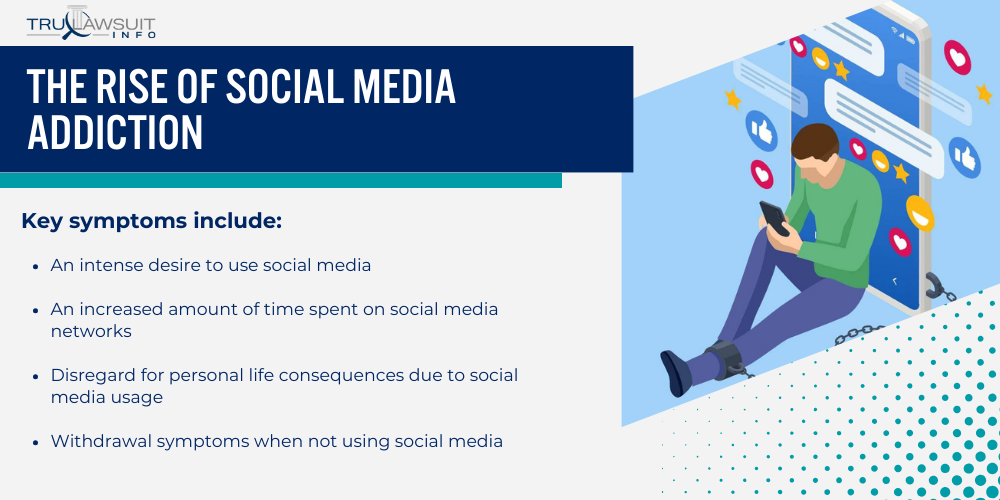
It’s a behavioral addiction that is threatening both individual and public mental health.
Defining Social Media Addiction and Its Symptoms
Social media addiction is a mental health condition characterized by the excessive use of platforms such as Facebook, Instagram, or TikTok, leading to negative impacts in one’s life.
Key symptoms include:
- An intense desire to use social media
- An increased amount of time spent on social media networks
- Disregard for personal life consequences due to social media usage
- Withdrawal symptoms when not using social media
Consistent engagement with social media platforms can lead to symptoms similar to those associated with substance addictions, such as mood modification, a need for tolerance, and withdrawal symptoms.
Prevalence of Social Media Addiction In Different Age Groups
Social media addiction is especially prevalent among young users.
However, its impact is wide-reaching across different age groups.
Research suggests:
- Adolescents are increasingly susceptible due to their high engagement levels with social media platforms.
- Young adults often report feelings of anxiety and depression linked to social media use.
- Older adults also experience social media addiction, although prevalence rates may be lower compared to younger demographics.
- The social media addiction claim suggests potential increases in usage across all age groups, pointing towards a trend rather than a phase.
The prevalence of social media addiction across various age groups underlines the need for a better understanding of this growing issue.
The Role of Algorithms in Promoting Social Media Addiction
In the context of the Social Media Addiction Lawsuits against tech companies, it’s become increasingly apparent how social media algorithms contribute to user retention and potential addiction.
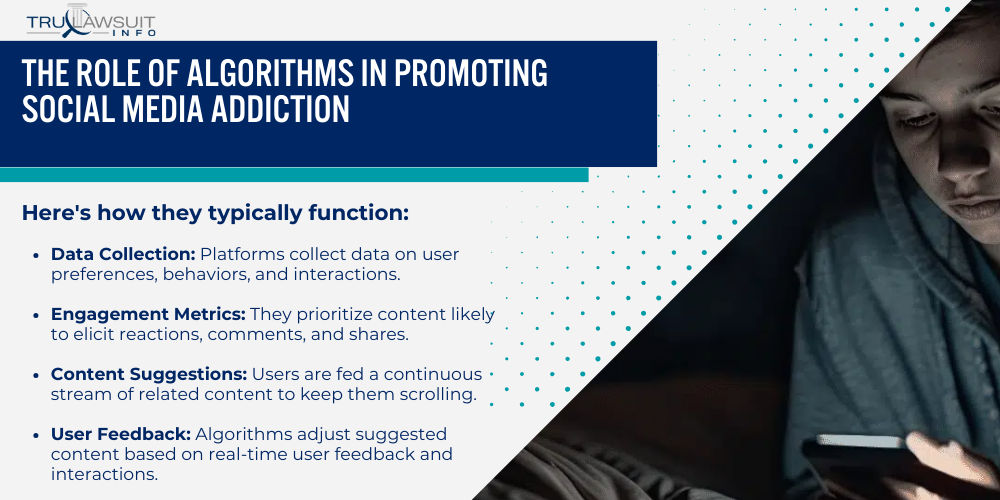
How Social Media Algorithms Work to Keep Users Engaged
Social media algorithms are designed to maximize user engagement by presenting personalized content that is likely to keep people on the platform for extended periods.
Here’s how they typically function:
- Data Collection: Platforms collect data on user preferences, behaviors, and interactions.
- Engagement Metrics: They prioritize content likely to elicit reactions, comments, and shares.
- Content Suggestions: Users are fed a continuous stream of related content to keep them scrolling.
- User Feedback: Algorithms adjust suggested content based on real-time user feedback and interactions.
- Reinforcement Loop: The cycle of interaction and content suggestion creates a compelling loop that encourages constant exposure to the platform.
These mechanisms have led to allegations of psychological or physical harm from sustained use.
Psychological Vulnerabilities Through Targeted Content
Social media platforms leverage sophisticated algorithms that may exploit psychological vulnerabilities by curating targeted content.
This can have notable implications:
- The algorithms often show content that aligns with a user’s prior interactions, which can lead to a narrowed perspective of the world and reinforce their beliefs and biases.
- Through internal research, some social media and tech giants have acknowledged the addictive nature of their platforms and their physical and psychological harm to users, especially adolescents.
- The constant engagement induced by algorithms can lead to a compulsive need for social media interaction, overshadowing offline relationships and activities.
- Exacerbating existing psychological conditions, such as anxiety or depression, has become a concern linked to the perpetual engagement people have with their social feeds.
Legal Basis for Social Media Addiction Lawsuits
Social media addiction lawsuits hinge on holding companies responsible for their product designs and the purported impact on users, particularly younger demographics.
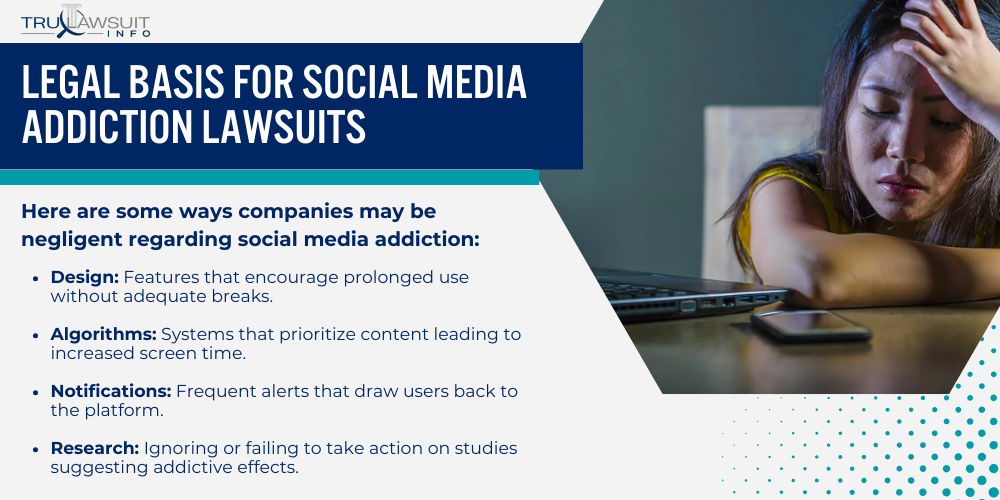
Negligence and Failure to Warn Users of Addictive Properties
Companies may be held liable for negligence if they fail to take reasonable care to avoid foreseeable harm to their users.
In the context of social media lawsuits, the allegation often revolves around the lack of warning provided to users about the addictive nature of their platforms.
Here are some ways companies may be negligent regarding social media addiction:
- Design: Features that encourage prolonged use without adequate breaks.
- Algorithms: Systems that prioritize content leading to increased screen time.
- Notifications: Frequent alerts that draw users back to the platform.
- Research: Ignoring or failing to take action on studies suggesting addictive effects.
Violation of Consumer Protection Laws and Deceptive Practices
Some legal actions focus on how social media platforms might violate consumer protection laws by employing deceptive practices that mislead users about their services’ addictive potential.
These are examples of potentially deceptive practices:
- Misrepresentation: Promising a safe user environment while algorithms foster addictive behavior.
- Targeting Minors: Directing features at younger users without disclosing associated risks.
- Data Use: Utilizing user data to refine and fortify addictive elements of the platform.
- Transparency: Failure to be forthcoming about the psychological impact of feature engagement.
The Social Media Addiction Lawsuits may result in a wide range of consequences, including policy changes and financial settlements.
They also have the potential to reach the highest levels of the judiciary, including the Supreme Court, setting precedents that affect the future of social media regulation.
Notable Social Media Addiction Lawsuits
In recent years, several social media addiction lawsuits have brought attention to the potential effects of social media platforms on users’ mental health, highlighting concerns over the addictive design and inadequate protection of young users.
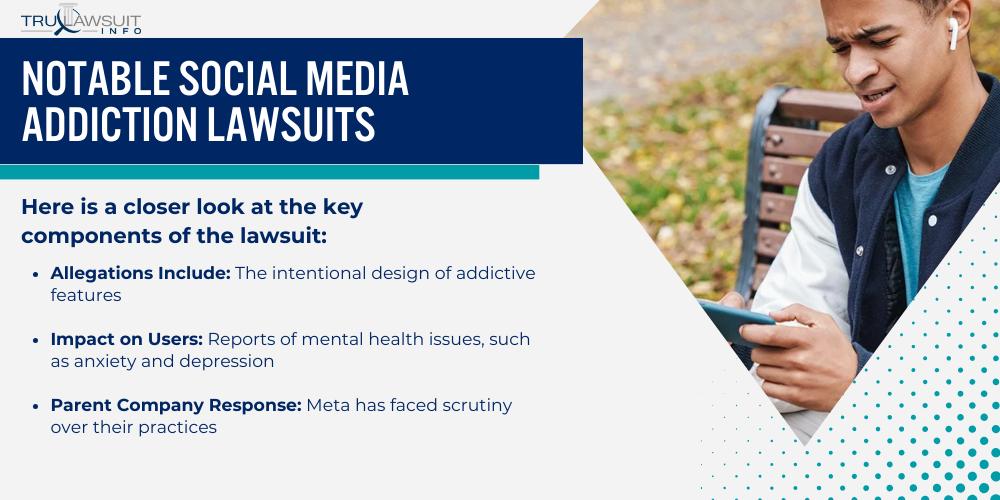
Social Media Addiction Lawsuits Against Major Social Media Platforms
California’s Attorney General and a coalition of attorneys general have taken legal action against Meta, asserting that the company has designed social media platforms with features that contribute to youth mental health issues.
One of the social media addiction lawsuits was co-led by 33 attorneys general and was filed in the U.S. District Court for the Northern District of California.
They argue that the platforms, specifically Instagram and Facebook, have caused harm by targeting younger audiences with addictive content.
Here is a closer look at the key components of the lawsuit:
- Allegations Include: The intentional design of addictive features
- Impact on Users: Reports of mental health issues, such as anxiety and depression
- Parent Company Response: Meta has faced scrutiny over their practices
- Social Media Attorneys’ Role: They are spearheading investigations and legal actions
Lawsuits Representing Addicted Users
Class action suits compile individual claims of harm due to social media addiction into a single, powerful legal challenge.
They can represent a range of grievances, including mental health deterioration and failure to protect users.
Details of the suits include the following key aspects:
- Case Reports: Include instances of attempted suicide linked to social media use
- Legal Claims: Accuse social media companies of negligence
- Represented Individuals: Often include minors and their families
- Legal Redress Sought: Aims for compensation and changes in social media platform policies
These notable social media addiction lawsuits underscore the growing concern over social media’s role in society and the imperative for platforms to consider the well-being of their users, especially the most vulnerable.
Proving Causation in Social Media Addiction Lawsuits
In Social Media Addiction Lawsuits, the burden of proof lies heavily on demonstrating that the platforms directly contribute to addictive behaviors and associated damages.
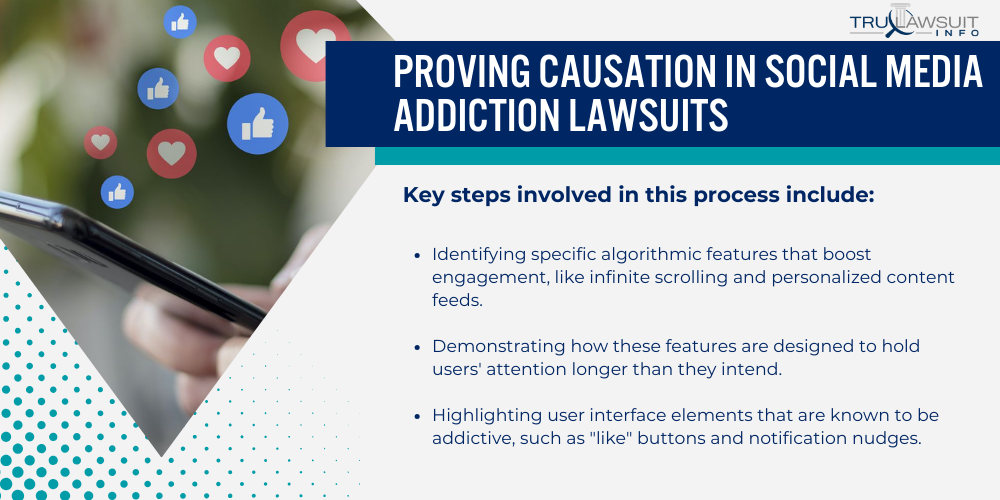
Establishing a Link Between Platform Algorithms and Addiction
Social media companies may be challenged in court to unveil how their algorithms encourage constant exposure to content, a factor that can lead to addiction.
Plaintiffs are tasked with proving a direct link between algorithmic practices and increasing users’ screen time to the point of psychological harm.
Key steps involved in this process include:
- Identifying specific algorithmic features that boost engagement, like infinite scrolling and personalized content feeds.
- Demonstrating how these features are designed to hold users’ attention longer than they intend.
- Highlighting user interface elements that are known to be addictive, such as “like” buttons and notification nudges.
- Providing evidence that excessive screen time, as a result of these algorithms, leads to harmful behaviors like low self-esteem or self-harm.
Expert Testimony on the Psychological Impact of Social Media
It is essential for litigation to include expert testimony to elucidate the psychological effects of social media.
Experts typically cover a range of impacts stemming from overuse, which include:
- Providing detailed analyses on how social media can negatively impact mental health, particularly causing low self-esteem.
- Discussing studies that link excessive social media use to self-harm and suicidal thoughts.
- Explaining how the social validation loop, intrinsic to Facebook and other social media platforms, may contribute to addiction.
- Assessing the long-term psychological consequences of social media addiction on users, especially adolescents whose brains are still developing.
The aim is to firmly establish the connection between platform design and user safety, reinforcing that the impact on mental health is not just coincidental but a result of engineered addiction.
Defenses Raised by Social Media Companies
Social media companies have mounted defenses in light of recent lawsuits accusing them of fostering addiction in users, especially youth.
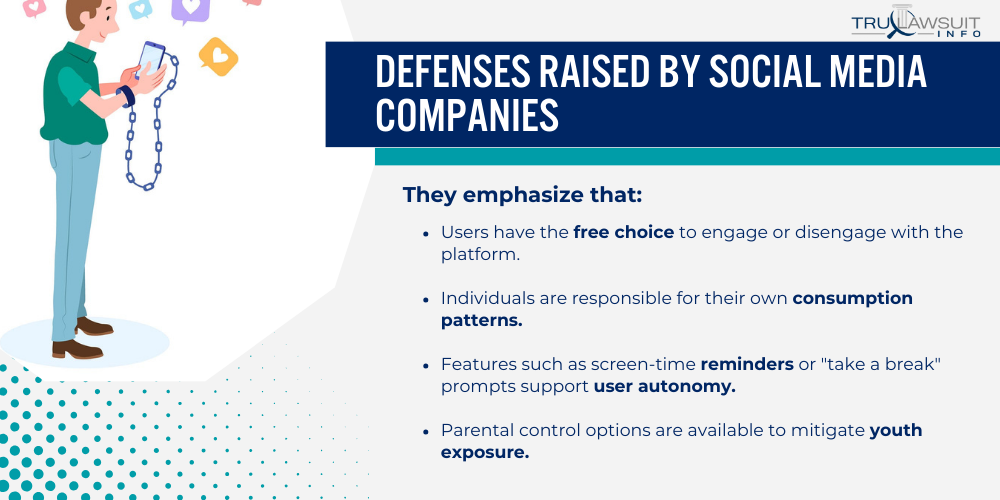
These defenses are multifaceted, highlighting both the autonomy of users and the legal protections afforded to these platforms.
Arguing User Responsibility and Free Choice
Social media giants assert that their platforms are tools that offer value but require personal responsibility in their use.
They emphasize that:
- Users have the free choice to engage or disengage with the platform.
- Individuals are responsible for their own consumption patterns.
- Features such as screen-time reminders or “take a break” prompts support user autonomy.
- Parental control options are available to mitigate youth exposure.
Invoking Section 230 of the Communications Decency Act
Explaining their legal standing, social media companies invoke Section 230 as shield legislation.
Key points include:
- Section 230 offers immunity from liability for content posted by third parties.
- It is argued that the Act permits platforms to provide an open forum for free speech without being publishers.
- The defense posits that holding platforms accountable for user content could hinder a vigorous online ecosystem.
- They maintain that filtering and removing harmful content are done in good faith, according to the statute.
Through these defenses, the companies are trying to navigate the legal landscape while emphasizing the responsibility and agency of their users.
Potential Outcomes of Social Media Addiction Lawsuits
The increasing number of legal actions against social media companies may result in significant changes for both the users and the industry as a whole.
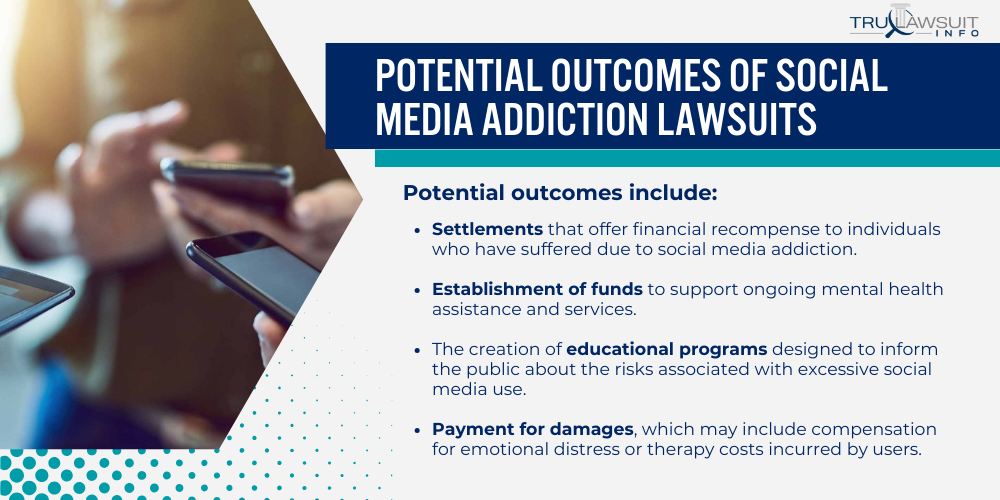
These lawsuits aim to hold companies accountable for the alleged design of platforms that foster addiction and negatively impact mental health.
Monetary Compensation for Affected Users
Bold actions in the legal space signal a turn in holding social media giants accountable.
Potential outcomes include:
- Settlements that offer financial recompense to individuals who have suffered due to social media addiction.
- Establishment of funds to support ongoing mental health assistance and services.
- The creation of educational programs designed to inform the public about the risks associated with excessive social media use.
- Payment for damages, which may include compensation for emotional distress or therapy costs incurred by users.
Court-Mandated Changes to Social Media Algorithms
Legal pressures may enforce substantial revisions to operational frameworks.
The main focus points are:
- Reforming feed algorithms to reduce the compulsive engagement tactics used by platforms.
- Transparency in how content is delivered to users, with an emphasis on the provision of healthier interaction patterns.
- Limits on features known to encourage continuous scrolling, such as infinite feeds or addictive content loops.
- Integration of tools that allow users to understand and control their usage patterns more effectively.
With these potential outcomes, social media addiction claims are clearly pushing for a shift.
They seek justice and propel regulatory efforts to curb addictive social media practices.
Users may find themselves navigating a very different social media environment if these lawsuits succeed.
Broader Implications of Social Media Addiction Litigation
Litigation against social media companies for their role in fostering addiction underlines a growing concern about the health implications of these platforms.
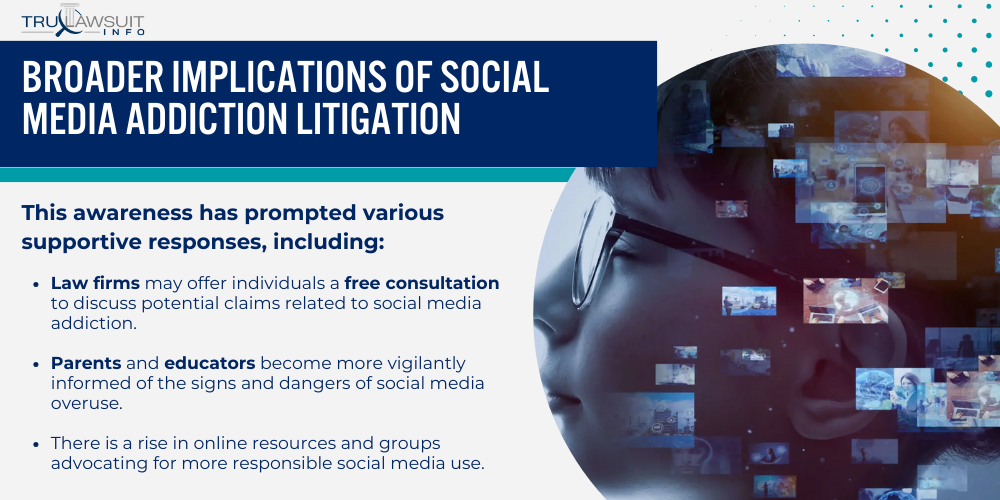
Increased Public Awareness of the Risks of Social Media Use
Increased public awareness is a significant outcome of high-profile lawsuits.
Litigation often brings to light information that might otherwise remain under the radar.
For example, claims against social media companies have elucidated potential links between heavy platform use and mental health problems such as binge eating disorders and depression in young people.
This awareness has prompted various supportive responses, including:
- Law firms may offer individuals a free consultation to discuss potential claims related to social media addiction.
- Parents and educators become more vigilantly informed of the signs and dangers of social media overuse.
- There is a rise in online resources and groups advocating for more responsible social media use.
- Healthcare professionals are increasingly discussing social media’s impact with their patients.
Regulatory Efforts to Curb Addictive Social Media Practices
Lawsuits also paint a clear picture of the need for stricter regulation to hold social media giants accountable for the negative impact of their products.
A tangible shift in how social media firms operate could emerge from such legal challenges.
Potential regulatory measures include:
- Regulations aimed at increasing transparency and accountability may be introduced.
- Policymakers are incentivized to closely examine and legislate the design and algorithms of social media platforms.
- Social media companies might be required to implement features that mitigate risks, like screen-time reminders.
- Industry standards for ethical design could be developed, helping reduce the addictive nature of social media.
This litigation has far-reaching consequences, potentially altering the fabric of social media interaction and the responsibility placed on the companies behind these powerful communication tools.
The Future of Social Media Addiction Lawsuits
As legal actions against major social media companies gain momentum, the trajectory of these lawsuits appears poised to reshape industry practices and establish precedents for digital responsibility.
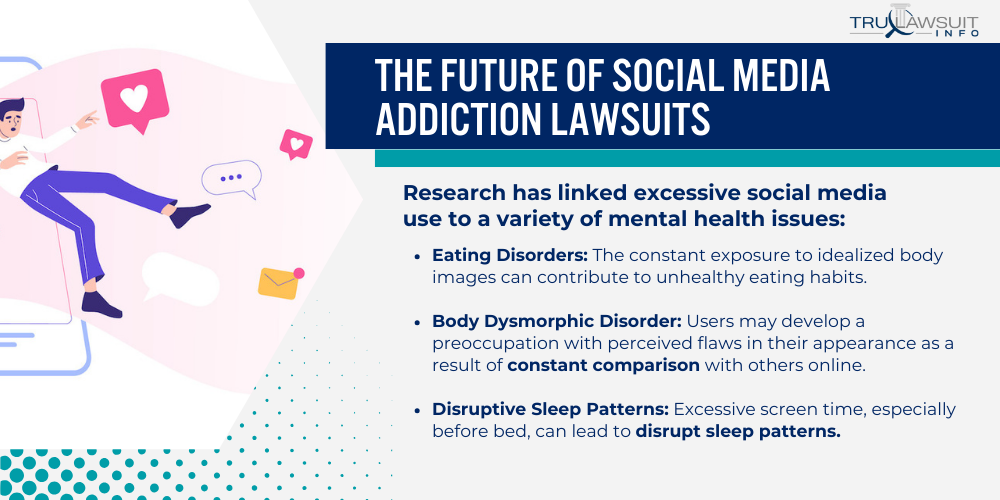
Long-Term Effects of Social Media Addiction
Understanding the long-term effects of social media addiction on individuals is essential for these lawsuits.
Research has linked excessive social media use to a variety of mental health issues:
- Eating Disorders: The constant exposure to idealized body images can contribute to unhealthy eating habits.
- Body Dysmorphic Disorder: Users may develop a preoccupation with perceived flaws in their appearance as a result of constant comparison with others online.
- Disruptive Sleep Patterns: Excessive screen time, especially before bed, can lead to disrupt sleep patterns.
These effects are potentially leading to a better grasp of how social media platforms might be designed to mitigate such risks.
Adapting Legal Strategies to Address Evolving Technologies
Legal strategies need to adapt to the ever-changing social media landscape.
As companies introduce new features, attorneys are crafting more precise arguments to hold these platforms accountable:
- Lawyers are offering a free case review to individuals claiming harm from social media use.
- Plaintiffs include claims related to negative impacts on body image and mental health.
- Courts are considering how algorithms encourage compulsive use, thereby potentially leading to addiction.
- Legal teams are focusing on evidence that suggests platforms are knowingly designed to make leaving difficult.
Lawsuits against technology companies concerning social media addiction are not only about seeking remedies for those affected; they also aim to catalyze a shift in how social media platforms operate with respect to user well-being.
Trulawsuit Info: #1 Social Media Addiction Lawyers
TruLawsuit Info can address your concerns related to the impact of platforms like Instagram and Facebook on the mental health of youth.

Services offered by Trulawsuit Info encompass:
- Free consultation to evaluate potential legal claims.
- Guidance through the legal action process against social media companies.
- Development of strategies to demonstrate the addictive nature of social media platforms.
- Representation in court to hold responsible parties accountable.
They may be entitled to legal remedies.
The team at Trulawsuit Info approaches each case with a clear strategy, aiming to provide justice and compensation for the affected individuals.
Frequently Asked Questions
-
What legal actions have been taken against social media platforms regarding addiction?
Several multi-district litigations (MDLs) and state-led lawsuits have targeted major social media companies.
Plaintiffs’ lawsuits allege that platforms are designed to maximize screen time, leading to addiction and mental health problems.
Prominent cases involve Meta Platforms, Inc. and subsidiaries, Snap, Inc., and TikTok, among others as seen in the Social Media Adolescent Addiction.
-
How does a social media lawsuit address mental health issues?
Lawsuits have claimed that social media companies design features that are harmful to children’s mental health.
These features are purportedly addictive and expose users to content detrimental to their well-being, as highlighted by various attorneys general suing Meta for endangering kids’ mental health.
-
What are the precedents set by recent social media addiction litigation cases?
Recent litigation is in a relatively nascent stage, with settled precedents still emerging.
However, the outcomes of these cases are expected to inform the legal thresholds for duty of care and foreseeability regarding the design of social media platforms.
-
What compensation have plaintiffs received in social media addiction lawsuits?
Plaintiffs in social media addiction suits often seek compensatory damages, including coverage for treatment costs and emotional distress.
While definitive compensation figures are yet undisclosed, the collective settlements may lead to significant financial accountability for the involved companies.
-
How is social media addiction being legally defined in recent cases?
In legal contexts, social media addiction is being discussed in terms of product defectiveness and negligent design.
The courts are reviewing whether the platforms’ engagement strategies intentionally contribute to addictive behaviors.
By examining these questions, one can better understand the ongoing struggles and debates at the intersection of social media use, psychological well-being, and legal responsibility.

Experienced Attorney & Legal SaaS CEO
With over 25 years of legal experience, Jessie is an Illinois lawyer, a CPA, and a mother of three. She spent the first decade of her career working as an international tax attorney at Deloitte.
In 2009, Jessie co-founded her own law firm with her husband – which has scaled to over 30 employees since its conception.
In 2016, Jessie founded TruLaw, which allows her to collaborate with attorneys and legal experts across the United States on a daily basis. This hypervaluable network of experts is what enables her to share reliable legal information with her readers!
Have A Case?
Here, at Tru Lawsuit Info, we’re committed to helping victims get the justice they deserve.
To do this, we actively work to connect them with attorneys who are experts in litigating cases similar to theirs.
Would you like our help?
Tru Lawsuit Info is a reliable source of information about issues that may affect your health and safety, such as faulty products, data breaches, and environmental hazards.
Our team of experienced writers collaborates with medical professionals, lawyers, and advocates to produce informative articles, guides, and other resources that raise awareness of these topics.
Our thorough research provides consumers with access to reliable information and updates on lawsuits happening around the country. We also can connect consumers with attorneys if they need assistance.
Camp Lejeune's water contamination issue spanned several decades starting in the 1950s. Exposure to these chemicals has been linked to various serious health issues, including cancer, organ diseases, and death.
Research is increasingly suggesting a link between the use of Tylenol during pregnancy and the development of neurodevelopmental disorders, such as autism and ADHD, in infants.
Legal action is being taken against manufacturers of Aqueous Film-Forming Foam (AFFF), a chemical used in fighting fires. The plaintiffs allege that exposure to the foam caused health issues such as cancer, organ damage, and birth and fertility issues.
Have A Case?
Here, at Tru Lawsuit Info, we’re committed to helping victims get the justice they deserve.
To do this, we actively work to connect them with attorneys who are experts in litigating cases similar to theirs.
Would you like our help?







